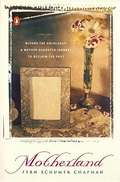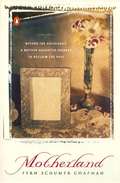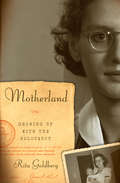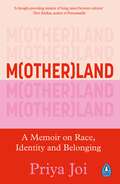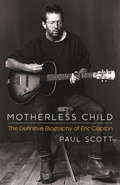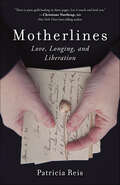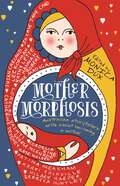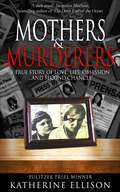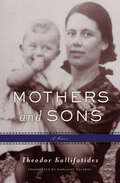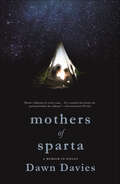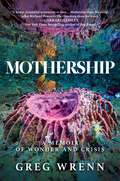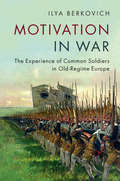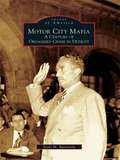- Table View
- List View
Motherhood: A Novel
by Sheila HetiA daring, funny, and poignant novel about the desire and duty to procreate, by one of our most brilliant and original writers.Motherhood treats one of the most consequential decisions of early adulthood--whether or not to have children--with the intelligence, wit and originality that have won Sheila Heti international acclaim, and which led her previous work, How Should a Person Be?, to be called "one of the most talked-about books of the year" (TIME magazine).Having reached an age when most of her peers are asking themselves when they will become mothers, Heti's narrator considers, with the same urgency, whether she will do so at all. Over the course of several years, under the influence of her partner, body, family, friends, mysticism and chance, she struggles to make a moral and meaningful choice.In a compellingly direct mode that straddles the forms of the novel and the essay, Motherhood raises radical and essential questions about womanhood, parenthood, and how--and for whom--to live.
Motherland
by Chapman Fern Schumer"In 1938, just before they were killed by the Nazis, Frieda and Siegmund Westerfeld sent their twelve-year-old daughter, Edith, to live with relatives in America. Edith escaped the death camps but was left profoundly adrift, cut off from the culture of her homeland, its traditions - her entire identity. For decades she shut away her memories, unable even to sing a German lullaby to her children, until she realized that the void of tbe past was consuming her and her family. Then, with her daughter Fern Schumer Chapman - herself a pregnant mother - Edith returned to Germany. " "For Edith the trip was an act of courage, a chance to reconnect with her homeland and reconcile with her past. For Fern the trip was a miraculous opening, a break in the wall of silence surrounding her mother's history. . . and her mother. "--BOOK JACKET. Title Summary field provided by Blackwell North America, Inc. All Rights Reserved
Motherland, Fatherland, Whateverland: Searching for Home
by Erik SmalhoutErik Smalhout was born a child of privilege in the Netherlands East Indies. Smalhout’s father sent his unruly son to a boarding school in Australia, just months before the Japanese seized the Netherlands East Indies in early 1942. While young Smalhout adapted to life in rural Australia, his sister and father back home were placed in Japanese prison camps, an experience that proved fateful for his father and changed his sister’s life forever. Serendipity followed him through induction in the WWII Dutch military, his postwar service on merchant ships circling the globe, and eventually to the most southern place on earth: the Mississippi Delta. Smalhout spent the rest of his life adapting to challenging circumstances time after time: first as a progressive Dutchman in the American South, then as an IRS agent in the nation’s second-largest financial center, and finally as a man who, due to a diagnosis of Alzheimer’s, often could not identify himself. Motherland, Fatherland, Whateverland: Searching for Home is Smalhout’s memoir, edited by his granddaughter, Erika Berry, and supported with pictures and documents that he saved throughout his lifetime. Smalhout’s story reminds readers that place is secondary to experience and that no matter where we are or what fortunate or unfortunate circumstances placed us there, an eternal curiosity for humanity will help us find a place in the world.
Motherland: A Feminist History of Modern Russia, from Revolution to Autocracy
by Julia IoffeFINALIST FOR THE NATIONAL BOOK AWARDAcclaimed journalist Julia Ioffe tells the story of modern Russia through the history of its women, from revolution to utopia to autocracy.In 1990, seven-year-old Julia Ioffe and her family fled the Soviet Union. Nearly twenty years later, Ioffe returned to Moscow—only to discover just how much Russian society had changed while she had been living in America. The Soviet women she had known growing up—doctors, engineers, scientists—seemed to have been replaced by women desperate to marry rich and become stay-at-home moms. How had Russia gone from portraying itself as the vanguard of world feminism to becoming a bastion of conservative Christian values?In Motherland, Ioffe turns modern Russian history on its head, telling it exclusively through the stories of its women. From her own physician great-grandmothers to Lenin’s lover, a feminist revolutionary; from the hundreds of thousands of Soviet girls who fought in World War II to the millions of single mothers who rebuilt and repopulated a devastated country; from the members of Pussy Riot to Yulia Navalnaya, the wife of opposition leader Alexey Navalny, Ioffe chronicles one of the most audacious social experiments in history and documents how it failed the very women it was meant to liberate—and how that failure paved the way for the revanche of Vladimir Putin.Part memoir, part journalistic exploration, part history, Motherland paints a portrait of modern Russia through the women who shaped it. With deep emotion, Ioffe reveals what it means to live through the cataclysms of revolution, war, idealism, and heartbreak—and how the story of Russia today is inextricably tied to the sacrifices of its women.
Motherland: A Memoir
by Pamela MarinPamela Marin was fourteen when her mother died of breast cancer. After keeping her illness a secret from her daughter, Mildred Marin left her home in Evanston, Illinois, to spend her last months alone and without treatment in California. When she died in 1973, her husband buried the family's memories with her -- clearing the house of her belongings, avoiding any mention of her, and never once taking his young daughter to her mother's grave. Before Marin was out of her teens, her father went bankrupt and moved in with his thirty-years-younger girlfriend. Now in this luminous memoir, written with rare grace and unflinching honesty, Marin chronicles how she came to reject her father's dismissal of the past and ultimately to embark on a cross- country search for traces of the mother she never really knew. With family and home gone, Marin got to work supporting herself, first as a waitress in Chicago's northside bars, then as a secretary, and finally as a journalist, landing a job as a staff writer at a newspaper in Southern California when she was twenty-seven. Two years later, happily ensconced in a beach house with the man who would become her husband and the father of her children, Marin began to dream about the mother who'd been gone for more than half her life. Those haunting dreams led to the quest at the heart of Motherland. Fifteen years after Mildred Marin's death, the author dropped out of her own life to research her mother's. Using her reporter's skills, Marin traveled to Tennessee, where her mother was born and reared; to Chicago, where her mother worked as a commercial artist and met the man she would marry; and back to California, where Mildred Marin went to die. Along the way, Marin collected treasured artifacts as well as others' memories of her mother. She confronted her father about the silence that enshrouded his wife's illness and death, causing a rift in their relationship that would last until he died a decade later. Motherland is a journey shot through with love and pain. It is a story of loss, discovery, and, ultimately, forgiveness. By coming to terms with her mother's life, Pamela Marin opened the way for the emotional intimacy she had craved as a child -- and finally found in her own motherhood.
Motherland: A Memoir of Love, Loathing, and Longing
by Elissa Altman“I’m reading this book right now and loving it!”—Cheryl Strayed, #1 New York Times bestselling author of WildHow can a mother and daughter who love (but don’t always like) each other coexist without driving each other crazy? “A wry and moving meditation on aging and the different kinds of love between women.”—O: The Oprah Magazine (“2019’s Best LGBTQ Books”) After surviving a traumatic childhood in nineteen-seventies New York and young adulthood living in the shadow of her flamboyant mother, Rita, a makeup-addicted former television singer, Elissa Altman has managed to build a very different life, settling in Connecticut with her wife of nearly twenty years. After much time, therapy, and wine, Elissa is at last in a healthy place, still orbiting around her mother but keeping far enough away to preserve the stable, independent world she has built as a writer and editor. Then Elissa is confronted with the unthinkable: Rita, whose days are spent as a flâneur, traversing Manhattan from the Clinique counters at Bergdorf to Bloomingdale’s and back again, suffers an incapacitating fall, leaving her completely dependent upon her daughter. Now Elissa is forced to finally confront their profound differences, Rita’s yearning for beauty and glamour, her view of the world through her days in the spotlight, and the money that has mysteriously disappeared in the name of preserving youth. To sustain their fragile mother-daughter bond, Elissa must navigate the turbulent waters of their shared lives, the practical challenges of caregiving for someone who refuses to accept it, the tentacles of narcissism, and the mutual, frenetic obsession that has defined their relationship. Motherland is a story that touches every home and every life, mapping the ferocity of maternal love, moral obligation, the choices women make about motherhood, and the possibility of healing. Filled with tenderness, wry irreverence, and unforgettable characters, it is an exploration of what it means to escape from the shackles of the past only to have to face them all over again.Advance praise for Motherland“Rarely has a mother-daughter relationship been excavated with such honesty. Elissa Altman is a beautiful, big-hearted writer who mines her most central subject: her gorgeous, tempestuous, difficult mother, and the terrain of their shared life. The result is a testament to the power of love and family.”—Dani Shapiro, author of Inheritance“Elissa Altman’s Motherland traces the history of a particularly complicated relationship. Wise, evocative, and rich in insight, this compassionate and beautiful memoir is ultimately an act of love.”—Claire Messud, author of The Burning Girl
Motherland: A Mother-Daughter Journey to Reclaim the Past
by Fern Schumer ChapmanOne woman's moving story of her journey with her mother to find their past and the tragedy that haunts it. In 1937, Edith Westerfeld's parents--before being killed by the Nazis--sent her from Germany to live with relatives in America. Fifty-four years later, Edith decided that it was time, with her grown daughter Fern, to revisit the town she had left so many years before. For Edith the trip was a chance to reconnect and reconcile with her past; for Fern it was a chance to learn what lay behind her mother's silent grief. On their journey, Fern and her mother shared many extraordinary encounters with the townspeople and--more importantly--with one another, closing the divide that had long stood between them.
Motherland: Growing Up with the Holocaust
by Rita GoldbergA groundbreaking second-generation memoir of the Holocaust and its legacy by Otto Frank&’s goddaughter—&“The extraordinary tale is heroic&” (The New York Times). Rita Goldberg recounts the extraordinary story of her mother, Hilde Jacobsthal, a close friend of Anne Frank&’s family who was fifteen when the Nazis invaded Holland. After the arrest of her parents in 1943, Hilde fled to Belgium, living out the war years in an extraordinary set of circumstances—first among the Resistance, and then at Bergen-Belsen after its liberation. In the words of The Guardian, the story is &“worthy of a film script.&” As astonishing as Hilde&’s story is, Rita herself emerges as the central character in this utterly unique memoir. Proud of her mother and yet struggling to forge an identity in the shadow of such heroic accomplishments—not to mention her family&’s close relationship to the iconic Frank family—Goldberg offers an unflinching look at the struggles faced by children and grandchildren whose own lives are haunted by historic tragedy. Motherland is the culmination of a lifetime of reflection and a decade of research. It is an epic story of survival, adventure, and new life. &“A double memoir that braids her parents&’ story with her own, and succeeds in articulating a difficult truth.&” —The Economist
Motherland: What I’ve Learnt about Parenthood, Race and Identity
by Priya Joi'This is the kind of book I wish I had access to as a young mum' Nadiya Hussain___________What does it mean to be a parent in a space where you are the minority?Meandering through a supermarket highway of camembert and baguettes, Priya Joi heard a heart-stopping confession about her daughter's identity that made her entire being implode like a dying star. Confronted with the fact that maybe her daughter was not entirely at peace with her appearance, she suddenly had to grapple not only with motherhood but also how to talk to her kid about race and identity.In M(other)land, Joi writes powerfully about how her personal and cultural identity intersect with motherhood - and how they inform her identity as a (British-Indian) parent and step-parent. The book is her powerful, witty response to the absence of an inclusive, accessible blueprint for navigating life as a multi-faceted mother. By sharing her own story, she writes into this silence and provides a voice of understanding for all those who fall outside of dominant presentations of 'parenthood' and have never seen themselves or their experiences represented.M(other)land is a crucial book for anyone trying to navigate the complexities of race and motherhood, who has ever felt 'other', who has struggled to reconcile their past or cultural upbringing with how they raise the next generation. Joi passes on hard-won knowledge that has taken years to learn: the complexity of your identity is just who you are - it's okay to be both, neither, or multiple things at once - instead of fighting it, feeling 'neither' is a strength and a state of mind that you can revel in.___________'A beautifully written memoir and a thought-provoking critical intervention into race and motherhood - we can all learn something from this brilliant must-read book' Julia Samuel, leading British psychotherapist and bestselling author
Motherless Child: The Definitive Biography of Eric Clapton
by Paul ScottFrom the Yardbirds to Cream, Blind Faith to Derek and the Dominos, and a hugely-successful solo career, Eric Clapton's fifty years in the music business can look like an uninterrupted rise to become one of the greatest guitar players who ever lived. But his story is as complicated as it is fascinating.Clapton's god-like skill with a guitar was matched by an almost equal talent for self-destruction. He has never shied away from telling the truth about his battles with drink and drugs - or the sometimes catastrophic impact they had on the other people in his life, including his first wife Pattie Boyd. And without those deep personal lows we may never have had the musical highs that won him millions of fans. His story is also one of a long but successful road to sobriety, redemption and happiness.Motherless Child chronicles Clapton's remarkable journey: the music, the women, the drugs, the cars, the guitars, the heartbreak and the triumphs are all here. The book includes interviews with some people close to Clapton who have never spoken on the record before. It explores his musical legacy as one of the most influential musicians of his generation, and as the keeper of the flame for the blues.
Motherless Child: The Definitive Biography of Eric Clapton
by Paul ScottTimed for release around Clapton's 70th birthday, MOTHERLESS CHILD will be the ultimate celebration and definitive biography of one of the most influential musicians alive today. From the 1960s graffiti proclaiming 'Clapton is God', to his seminal work in supergroup Cream and his phenomenally successful solo career, Eric Clapton has achieved the status of bona fide living legend and enduring icon. Now in his sixth decade in the music business, he occupies an exulted position at the pinnacle of the rock world thanks to songs like Layla, Wonderful Tonight and Tears In Heaven, and for many is considered the greatest guitarist who ever lived. This book will chart his rise to stardom in the 60s and his unparalleled success since walking out of the Yardbirds as a 20-year-old to follow his chosen path of the blues with John Mayall's Bluesbreakers and later with Jack Bruce and Ginger Baker in supergroup Cream, as well as his successful solo career. However, his success has come at a price. Once a happy well-adjusted boy, the young Clapton was devastated by the realisation at the age of nine that the woman he thought was his sister was in fact his mother, and that the couple he thought were his parents were his maternal grandparents. His treatment by his mother was also to shape his future turbulent relationships with the women in his life, including his failed first marriage to model Pattie Boyd, who was married to Clapton's close friend George Harrison when he fell for her. Motherless Child also chronicles his battles with the demons of drugs and alcohol, his successful journey to sobriety, and examines his legacy as one of the most influential musicans of his generation. This is essential reading for any Clapton fan.
Motherlines: Love, Longing, and Liberation
by Patricia ReisWhen she was twenty, Patricia Reis’s mother asked, “What about your spiritual life?” Years later, this question drives her midlife quest to reconcile the desires of her body with the mandates of her spirit. Motherlines is a candid and compelling story of sex with men and with women, of celibacy, illegal abortions, making vows and breaking them, dreams, body wisdom, creative ambition, and inspiring relationships with memorable characters. This unflinching memoir illuminates the unvarnished truth of growing up female in the 1980’s a rich and fertile period in American history when gender roles were undergoing a revolution, a time that includes feminism, the women’s spirituality movement and liberation theology. In her soul-searching quest for meaning, and longing for maternal connection, Reis discovers an unlikely confidante in her aunt, a free-spirited Franciscan nun. Their letters and relationship are a thread that weaves throughout this memoir – an increasingly intimate and honest exchange between two women who are living very different lives yet are both kin and kindred spirits. A spiritual journey and a creative tour de force, this memoir is a potent and tender love song to the Motherlines that connect us all.
Mothermorphosis: Australian storytellers write about becoming a mother
by Monica DuxThe mythology of motherhood is often reduced to clich�. But how do we articulate the complex internal conflicts, the exhilaration and the absurdity of this transformation? Mothermorphosis is a collection of essays on the experience as told by some of Australia's most talented writers and storytellers. In these stories we read about the yearning for a child, the private and public expressions of love, identity in the face of motherhood, gratitude, pride, celebration and loss. Ultimately we learn that there is no one version of this epic story, no one tale that could ever speak for all, and no one way of encapsulating the experience. However, in reading other women's experiences, the hard bits, the ridiculous bits, we can only become more compassionate, not just to other mothers but hopefully to ourselves.
Mothers & Murderers: A True Story of Love, Lies, Obsession . . . And Second Chances
by Katherine Ellison&“[Weaves] together her own story and a stranger-than-fiction true-crime tale…gripping prose that by turns is tragic and hilarious.&”—Stephen Hinshaw, author of Another Kind of Madness This remarkable memoir by a Pulitzer Prize- and Polk Award-winning journalist takes readers on a wild, tragicomic ride from the criminal courtrooms of California&’s Silicon Valley to the Himalayan mountains of Pakistan to the deserts of Ethiopia. In delightful, insightful prose, Katherine Ellison reflects on her mistakes and her triumphs as she reveals the stories of how her career almost ended before it began, how she nearly missed marrying the love of her life, and how she unwittingly got drawn into a bizarre murder case. Rich in drama and self-reflection, replete with unique characters—including two bumbling hitmen, a rodeo-riding prosecutor, a flamboyant Beverly Hills defense attorney, and a charismatic stay-at-home mother-of-three who is keeping outrageous secrets—Mothers & Murderers is like a mashup of Fargo and Eat, Pray, Love—a memoir to make you laugh, cry, and think. &“In what she&’s authentically dubbed a &‘true-crime memoir, Katherine Ellison brings to bear the demons of her own past, her considerable chops as a reporter, and her willingness to plunge into the psychological depths. What she created is a dark jewel. The reader cannot look away.&”—Jacquelyn Mitchard, New YorkTimes-bestselling author of The Deep End of the Ocean &“Mothers and Murderers is like nothing else I&’ve ever read, and I mean that in the best possible way…Katherine Ellison captivatingly describes a young woman's path from blind impulse to wisdom…she makes an ultra-strong case for the examined life, shedding light on the lies we tell ourselves and others—and the hard work involved in taking responsibility for yourself.&”—Stephen Hinshaw, author of Another Kind of Madness
Mothers Are Made: How One Mom Overcame Perfectionism, Self-Doubt, Loneliness, and Anxiety and Became a Better and Happier Parent
by Danielle Sherman-LazarA deeply personal motherhood memoir about how the challenges moms face daily sharpen them into stronger, braver, and better parents for their children.Motherhood is hard. It's full of plenty of moments where a mom might think, &“I don&’t know if I can do this.&” Danielle Sherman-Lazar has had this thought many times as she&’s raised her four young daughters under 10, from her struggles with breastfeeding to two of her daughters&’ stays at the NICU. Through personal and honest stories on motherhood and her struggles with eating disorders, Mothers Are Made shows how moms aren&’t instantly born along with their babies—mothers are made through time and experience. It's when mothers go through the fire, Danielle argues, that we are forged into resilient, brave, and courageous parents.Danielle's writing is raw and relatable, and she shows how overcoming challenges with eating disorders, then facing the challenges of perfectionism, self-doubt, anxiety, and loneliness has given her tremendous inner strength, resilience, and confidence. Through real stories full of honesty, love, tenderness, and humor, she reminds her readers that they, too, have the knowledge and tenacity to persevere through any obstacle.Mothers Are Made will help moms realize that they can handle crises as they arise—large or small. And they will recognize that they are not alone in their struggles. Danielle&’s vulnerability will help readers find the courage to keep going through the uncomfortable parts of motherhood, knowing they&’ll get to the other side—a better, happier, and stronger mom.
Mothers and Other Fictional Characters: A Memoir in Essays
by Nicole Graev LipsonUSA Today Bestseller “Sensitive, searingly intelligent, and beautifully written.” —Claire Dederer, author of Monsters: A Fan’s Dilemma “This is—for real—a masterwork, one I will return to over and over." —Joanna Rakoff, author of My Salinger Year In this intimate and riveting memoir, Best American Essayist Nicole Graev Lipson breaks through the ready-made stories of womanhood, rescuing truth from the fiction that infiltrates our lives.What does it take to escape the plotlines mapped onto us? Searching for clues in the work of her literary foremothers, Lipson untangles what it means to be a girl, a woman, a lover, a partner, a daughter, and a mother in a world all too ready to reduce us to stock characters. Whether she’s testing the fragile borders of fidelity, embracing the taboo power of female friendship, escaping her family for the solitude of the mountains, grappling with what to do with her frozen embryos, or letting go of the children she imagined for the ones she’s raising, Lipson pushes beyond the easy, surface stories we tell about ourselves to brave less certain territory. As Lipson journeys through this thorny terrain, literature becomes her lodestar. Kate Chopin’s erotic story “The Storm” helps her reckon with the longings stirring below the surface of her marriage. Watching her son absorb the stifling codes of manhood, she finds unlikely parenting inspiration in Philip Roth’s most cartoonish overbearing mother. Summoning Gwendolyn Brooks, she asks, Can destroying one’s frozen embryos be understood as a maternal act? And accompanied by Shakespeare’s gender-bending heroine Rosalind, she seizes on the truest meaning of loving her oldest child. Risky and revealing, nourishing and affirming, rigorous and sexy, Mothers and Other Fictional Characters is a shimmering love letter to our forgotten selves—and the ones we’re still becoming.
Mothers and Sons: A Memoir
by Theodor KallifatidesAn aging writer&’s love letter to his elderly mother, this achingly beautiful work of autofiction traces their family&’s history in Greece and in exile.Theodor Kallifatides, an acclaimed Greek author exiled in Sweden for more than 4 decades at age 68, visits his 92-year-old mother, who still resides in Athens. Both know that this may be one of their last encounters before her death. During the week they spend together, they reminisce about the most important things in their lives, including the presence and absence of Theodor&’s father, whose life story he is reading. There, his father explains his difficult journey, from his origins as a Greek exile in Turkey through his months in a Nazi prison, and his passion for teaching.All this reveals the history of a family through the 20th century. But Kallifatides&’s book is above all a wonderful tribute to the love of his mother, depicted in an unforgettable way, while conveying a universal truth about the importance of our mothers.
Mothers of Sparta: A Memoir in Pieces
by Dawn Davies“Davies' collection of essays soars.... It's a memoir that locates the profound within the ordinary.” —Entertainment WeeklyIf you’re looking for a typical parenting book, this is not it. This is not a treatise on how to be a mother.This is a book about a young girl who moves to a new town every couple of years; a misfit teenager who finds solace in a local music scene; an adrift twenty-something who drops out of college to pursue her dream of making cheesecake on a stick a successful business franchise (ah, the ideals of youth). Alone in a new city, she summons her inner strength as she holds the hand of a dying stranger. Davies is a woman who finds humor in difficult pregnancies and post-partum depression (after reading “Pie” you might never eat Thanksgiving dessert the same way). She is a divorcee who unexpectedly finds second love. She is a happily married suburban wife who nevertheless makes a mental list of all the men she would have slept with. And she is a parent who finds herself tested in ways she could never imagine. In stories that cut to the quick, Davies explores passion, loss, illness, pain, and joy, told from her singular, gimlet-eyed, hilarious perspective.Mothers of Sparta is not a blow-by-blow of Davies’ life but rather an examination of the exquisite and often painful moments of a life, the moments we look back on and say, That one, that one mattered. Straddling the fence between humor and, well…not humor, Davies has written a book about what it’s like to try to carve a place for oneself in the world, no matter how unyielding the rock can be.
Mothers of the Mind: The Remarkable Women Who Shaped Virginia Woolf, Agatha Christie and Sylvia Plath
by Rachel Trethewey‘The relationship between my grandmother and her mother was very important and indeed crucial to her childhood and the very early days of her writing … So, to have more insight into this particular aspect of my grandmother’s early life is very valuable.’ Mathew Prichard, Agatha Christie’s grandsonVirginia Woolf, Agatha Christie and Sylvia Plath are three of our most famous authors. For the first time this book tells in full the story of the remarkable mothers who shaped them.Julia Stephen, Clara Miller and Aurelia Plath were fascinating women in their own rights, and their relationships with their daughters were exceptional; they profoundly influenced the writers’ lives, literature and attitude to feminism. Too often in the past Virginia, Agatha and Sylvia have been defined by their lovers – Mothers of the Mind redresses the balance by charting the complex, often contradictory, bond between mother and daughter. Drawing on previously unpublished sources from archives around the world and accounts from family and friends of the women, this book offers a new perspective on these iconic authors.
Mothership: A Memoir of Wonder and Crisis
by Greg WrennA dazzling, evidence-based account of one man&’s quest to heal from complex PTSD by turning to endangered coral reefs and psychedelic plants after traditional therapies failed—and his awakening to the need for us to heal the planet as well.Professor Greg Wrenn likes to tell his nature-writing students, &“The ecological is personal, and the personal is ecological.&” What he&’s never told them is how he&’s lived out those correspondences to heal from childhood abuse at the hands of his mother. Weaving together memoir and cutting-edge science, Mothership is not just a queer coming-of-age story. It&’s a deeply researched account of how coral reefs and a psychedelic tea called ayahuasca helped Greg heal from complex PTSD—a disorder of trust, which makes the very act of bonding with someone else panic-inducing. From the tide pools in Florida where he grew up, to Indonesia&’s Raja Ampat archipelago and the Amazon rainforest, this is his search for wholeness when talk therapy and pharmaceuticals did little to help. Along the way, as his ecological conscience wakes up, he takes readers underwater to the last pristine reefs on earth, and into the psyche.Written with prophetic urgency, Mothership ultimately asks if doses of nature will be enough to save us before it&’s too late.
Mothertrucker: Finding Joy on the Loneliest Road in America
by Amy Butcher'A beautifully written exploration of a woman's endeavour to let go of fear' JOEY SOLOWAY, creator of Transparent and I Love Dick'An unputdownable page-turner . . . an adventure into the expanse of Alaska's wild . . . I never wanted this book to end' T KIRA MADDEN, author of Long Live the Tribe of Fatherless Girls'There's truth and beauty on every page of this gorgeous and gripping book' CHERYL STRAYED, author of WildAmy Butcher was an accomplished college professor, mentor and writer, but in her own home, she was embarrassed and emotionally burdened by an increasingly abusive relationship. Exhausted and terrified of the ways her partner's behaviour could escalate, Amy reached out to Instagram celebrity Joy 'Mothertrucker' Wiebe. Joy was a fifty-year-old wife and mother and the nation's only female ice road trucker, a woman who maneuvered big rigs through the Alaskan wilderness along the deadliest road in America. Joy was everything Amy wanted to be: independent, fearless, and in charge of her life in a landscape dominated by men. Invited by Joy to ride shotgun, Amy found her escape on a road that was treacherous, beautiful, and exhilarating ? an adventurous ride through the Alaskan wilderness that was profoundly life changing.Mothertrucker is the story of that bracing four-hundred-mile journey navigating snow-glazed overpasses, ice-blue curves, and near plummets. It's also the stories that led them both to Alaska ? an interrogation of the reality of female fear, domestic violence, and how to overcome ? and an exploration into just how galvanizing friendships between women can be.Soon to be a major film starring Julianne Moore.
Mothertrucker: Finding Joy on the Loneliest Road in America
by Amy Butcher'A beautifully written exploration of a woman's endeavour to let go of fear' JOEY SOLOWAY, creator of Transparent and I Love Dick'An unputdownable page-turner . . . an adventure into the expanse of Alaska's wild . . . I never wanted this book to end'T KIRA MADDEN, author of Long Live the Tribe of Fatherless Girls'There's truth and beauty on every page of this gorgeous and gripping book' CHERYL STRAYED, author of WildAmy Butcher was an accomplished college professor, mentor and writer, but in her own home, she was embarrassed and emotionally burdened by an increasingly abusive relationship. Exhausted and terrified of the ways her partner's behaviour could escalate, Amy reached out to Instagram celebrity Joy 'Mothertrucker' Wiebe. Joy was a fifty-year-old wife and mother and the nation's only female ice road trucker, a woman who maneuvered big rigs through the Alaskan wilderness along the deadliest road in America. Joy was everything Amy wanted to be: independent, fearless, and in charge of her life in a landscape dominated by men. Invited by Joy to ride shotgun, Amy found her escape on a road that was treacherous, beautiful, and exhilarating. Mothertrucker is the story of that bracing four-hundred-mile journey navigating snow-glazed overpasses, ice-blue curves, and near plummets.Soon to be a major film starring Julianne Moore.(P) 2021 Brilliance Audio
Motivation in War: The Experience of Common Soldiers in Old-Regime Europe
by Ilya BerkovichThis book fundamentally revises our notion of why soldiers of the eighteenth century enlisted, served and fought. In contrast to traditional views of the brutal conditions supposedly prevailing in old-regime armies, Ilya Berkovich reveals that soldiers did not regard military discipline as illegitimate or unnecessarily cruel, nor did they perceive themselves as submissive military automatons. Instead he shows how these men embraced a unique corporate identity based on military professionalism, forceful masculinity and hostility toward civilians. These values fostered the notion of individual and collective soldierly honour which helped to create the bonding effect which contributed toward greater combat cohesion. Utilising research on military psychology and combat theory, and employing the letters, diaries and memoirs of around 250 private soldiers and non-commissioned officers from over a dozen different European armies, Motivation in War transforms our understanding of life of the common soldier in early modern Europe.
Motor City Mafia: A Century of Organized Crime in Detroit (Images of America)
by Scott M. BurnsteinMotor City Mafia: A Century of Organized Crime in Detroit chronicles the storied and hallowed gangland history of the notorious Detroit underworld. Scott M. Burnstein takes the reader inside the belly of the beast, tracking the bloodshed, exploits, and leadership of the southeast Michigan crime syndicate as never before seen in print. Through a stunning array of rare archival photographs and images, Motor City Mafia captures Detroit's most infamous past, from its inception in the early part of the 20th century, through the years when the iconic Purple Gang ruled the city's streets during Prohibition, through the 1930s and the formation of the local Italian mafia, and the Detroit crime family's glory days in the 1950s, 1960s, and 1970s, all the way to the downfall of the area's mob reign in the 1980s and 1990s.
Motorcycle Queen: The Story of Bessie Stringfield (Fountas & Pinnell Classroom, Guided Reading)
by Jonathan Bartlett Joan NicholsNIMAC-sourced textbook. Vrrroooommmm! Meet Bessie Stringfield, the pioneering black female motorcyclist who paved the way for all women to ride.

